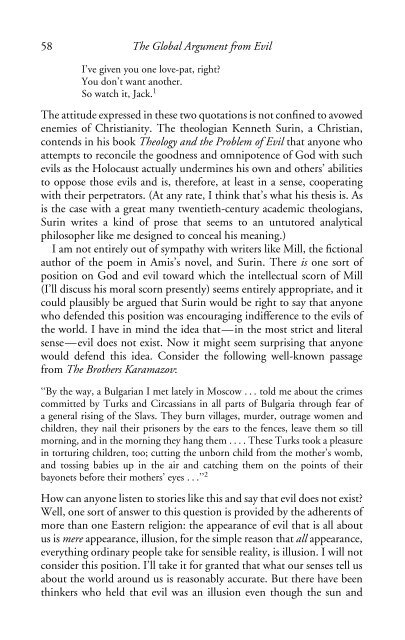The Problem of Evil - Common Sense Atheism
The Problem of Evil - Common Sense Atheism
The Problem of Evil - Common Sense Atheism
You also want an ePaper? Increase the reach of your titles
YUMPU automatically turns print PDFs into web optimized ePapers that Google loves.
58 <strong>The</strong> Global Argument from <strong>Evil</strong><br />
I’ve given you one love-pat, right?<br />
You don’t want another.<br />
So watch it, Jack. 1<br />
<strong>The</strong> attitude expressed in these two quotations is not confined to avowed<br />
enemies <strong>of</strong> Christianity. <strong>The</strong> theologian Kenneth Surin, a Christian,<br />
contends in his book <strong>The</strong>ology and the <strong>Problem</strong> <strong>of</strong> <strong>Evil</strong> that anyone who<br />
attempts to reconcile the goodness and omnipotence <strong>of</strong> God with such<br />
evils as the Holocaust actually undermines his own and others’ abilities<br />
to oppose those evils and is, therefore, at least in a sense, cooperating<br />
with their perpetrators. (At any rate, I think that’s what his thesis is. As<br />
is the case with a great many twentieth-century academic theologians,<br />
Surin writes a kind <strong>of</strong> prose that seems to an untutored analytical<br />
philosopher like me designed to conceal his meaning.)<br />
I am not entirely out <strong>of</strong> sympathy with writers like Mill, the fictional<br />
author <strong>of</strong> the poem in Amis’s novel, and Surin. <strong>The</strong>re is one sort <strong>of</strong><br />
position on God and evil toward which the intellectual scorn <strong>of</strong> Mill<br />
(I’ll discuss his moral scorn presently) seems entirely appropriate, and it<br />
could plausibly be argued that Surin would be right to say that anyone<br />
who defended this position was encouraging indifference to the evils <strong>of</strong><br />
the world. I have in mind the idea that—in the most strict and literal<br />
sense—evil does not exist. Now it might seem surprising that anyone<br />
would defend this idea. Consider the following well-known passage<br />
from <strong>The</strong> Brothers Karamazov:<br />
‘‘By the way, a Bulgarian I met lately in Moscow ...told me about the crimes<br />
committed by Turks and Circassians in all parts <strong>of</strong> Bulgaria through fear <strong>of</strong><br />
a general rising <strong>of</strong> the Slavs. <strong>The</strong>y burn villages, murder, outrage women and<br />
children, they nail their prisoners by the ears to the fences, leave them so till<br />
morning, and in the morning they hang them .... <strong>The</strong>se Turks took a pleasure<br />
in torturing children, too; cutting the unborn child from the mother’s womb,<br />
and tossing babies up in the air and catching them on the points <strong>of</strong> their<br />
bayonets before their mothers’ eyes ...’’ 2<br />
How can anyone listen to stories like this and say that evil does not exist?<br />
Well, one sort <strong>of</strong> answer to this question is provided by the adherents <strong>of</strong><br />
more than one Eastern religion: the appearance <strong>of</strong> evil that is all about<br />
us is mere appearance, illusion, for the simple reason that all appearance,<br />
everything ordinary people take for sensible reality, is illusion. I will not<br />
consider this position. I’ll take it for granted that what our senses tell us<br />
about the world around us is reasonably accurate. But there have been<br />
thinkers who held that evil was an illusion even though the sun and
















